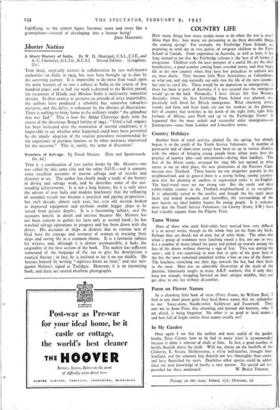COUNTRY LIFE
How many things how many people mean to do when the war is over! More than this: how many are presuming to do these desirable things the coming spring! For example, the Fairbridge Farm Schools are preparing to send one or two parties of emigrant children to the Farm School in Canada. From experience in Australia, as well as here, it has long seemed to me that tile Fairbridge scheme is the best of all forms ef emigration. Children with the least prospect of a useful life are the chief beneficiaries, a good number coming from crowded towns, and they begin life in the new country when they have few prejudices to unlearn and are most docile. They become little West Australians, or Colutribians, or what not, and step naturally not only into the life of the new countey, but Into its rural life. There would be no opposition to immigration, as there has been in parts of Australia, if it was assured that the immigrant would go on the land. Personally, I have always felt that Western Australia, where the first Fairbridge Farm School was planted, wai peculiarly well fitted for British immigrants. What charming rivers, woods, and farm and fruit lands cry out for workers in the glorious belt of country that stretches to the north of the right little, tight little harbour of Albany, past Perth and up to the Fairbridge Farm! It happened that the most arde-rit and successful older immigrants—or Jimmigrants—came from London and Lancashire towns.
Country Holidays Another form of rural activity, plotted fir the spring, but already begun, is to the credit of the Youth Service Volunteers. A number of permanent and of short-term camps have been set up in various districts with the object of bringing young people from urban areas into the practice of country jobs—and amusements—during their holidays. The first of the fifteen camps arranged for 1945 hns just opened in what seems to me an ideal place, the new plantations of the Forestry Commission near Thetford. These forests are not altogether popular in the neighbourhood, and in general there is a strong feeling among "countrymen that the planting of conifers in regimented ranks is un-English. The hard-wood trees are our strong suit. But the sandy and once rabbit-ridden country in the Thetford neighbourhood is an exception. It is admirably suited to the conifer, and though the firs repel most birds and indeed mammals and butterflies, the surroundings of the new forests are ideal holiday haunts for young people. It is welcome news that the Youth Service Volunteers (19 Cowley Street, S.W.) have had valuable support from the Pilgrim Trust.
Tame Wrens Most of those who stock bird-tables have noticed how very difficult it is to attract wrehs, though on the whole they are far from shy birds. Perhaps they are afraid, not of men, but of other birds. The other day when a group of woodmen were lunching round a fire, not one or two, hitt a number of wrens joined the party and picked up morsels among the feet of the diners without showing a sign of fear. This was during the snow ; and it was surprising to note that in spite of the great heat of the fire the snow remained unmelted within a foot or two of the flames. The lunchers, stretching out their legs towards the fire, had their heels in the snow. Here was an admirable illustration of the truth of the doctrine, laboriously taught to many A.R.P. workers, that if only they keep low enough, wriggling forward on their antique middles, they can get close to any fire without discomfort.
Poem on Flower Names In a charming little book of verse (Forty Poems, by William Box), I find in one short poem quite four' local flower names that are unfamiliar to me: Sauce-alone, Needle-whin. Sicklewort and Easterwell. They sent me to Anne Pratt, that charming and learned old botanist, who, I am afraid, is being forgotten. No other is so good at local names ; ana how full of bright similes these names usually are!
In My Garden Once again I see that the earliest and most useful of the garden heaths, Erica Carnea (now to be had in many tints) is recommended because it alone is tolerant of chalk or lime. In fact, a good number of heaths flourish above the chalk. With me, almost on the foothills of the Chilterns, E. Stricta, Mediterranea, a white bell-heather, brought from Scotland, and the common ling flourish not less thoroughly than carnea and have flourished for years. Doubtless other species could be added. since my own knowledge of heaths is very narrow. No special soil was provided for those mentioned. W. BEACH THOMAS.
Postage on this issue: Inland, zid.; Overseas, Id.






















 Previous page
Previous page